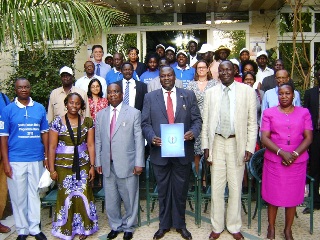S. Sudan: Health Ministry, partners renew anti-Malaria fight
March 19, 2012 (JUBA) – South Sudan’s Health Ministry, Malaria Consortium and other international partners have signed the Malaria programme review, renewing their commitment to fight the disease.

Earmarked over a one-year period, the Malaria programme review, will reportedly be used by the Health Ministry, with support from Malaria Consortium, to develop the Malaria Strategic Plan 2014-2018.
“The Malaria programme review is a key milestone for the now independent Republic of South Sudan and provides an opportunity for an increased commitment to malaria control across the country. We are very happy to continue our support and strong partnership with the Ministry of Health as they move closer to fulfilling the Abuja commitments,” said Ruth Allan, Malaria Consortium’s Country Director.
Malaria, official say, accounts for between 20% – 40% of all health facility visits in South Sudan, as well as 30% of all hospitals admissions. Currently, the disease is reportedly the leading cause of death in children under five in the country.
Harriet Pasquale, the ministry’s National Malaria Control Program Manager commended Malaria Consortium and other partners for their continued support in Malaria fight, describing the programme review as a “landmark in the re-orientation of the programme to effectively deal with malaria.”
She appealed to all partners in the country to join hands in order to “aggressively” eliminate malaria out of South Sudan.
The United Nations World Health Organisation (WHO), UN Children’s Fund (UNICEF), UN Refugee agency (UNHCR), UK Department for International Development (DIFID), US Agency for International Development (USAID), World Bank and Population Service International (PSI), were among the other international partners that agreed on a comprehensive strategy to control Malaria in the country.
South Sudan Vice President, Riek Machar presided over the ceremony, organised by the Health Ministry in the capital, Juba. Machar signed the agreement on behalf of government.
(ST)
